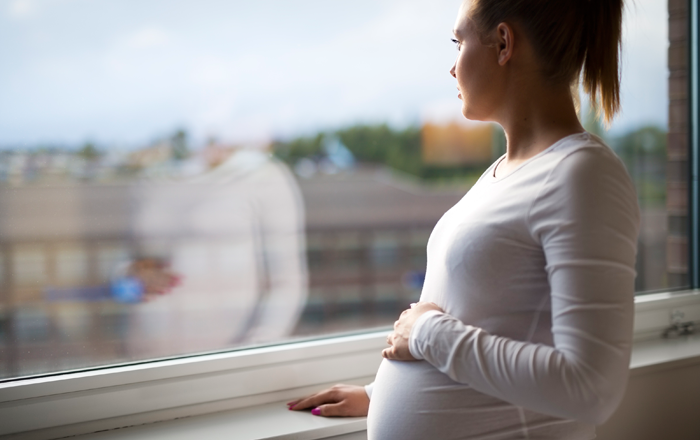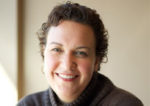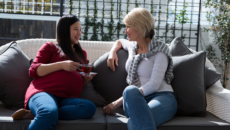I often think back to my domestic adoption process as a hopeful adoptive mom. While I was diligently crossing off the many tangible to-dos—fingerprints, financials, physicals—my daughter’s birth mother was facing her own, very different process, which started from: I’m pregnant. Now what?
Back then, it was hard to see past the pile of paperwork to understand the emotional twists and turns that an expectant mother considering adoption faces. In truth, seven years later, there are still things I am discovering about this time. This is a humble attempt to offer a peek inside the adoption process from the expectant mother’s perspective. My hope is that it can better inform both sides, making for a more empathetic and enlightened process.
Meet the birth mothers:
Amy, 35, placed twelve years ago
Jeni, 44, placed seven years ago
Margaret, 22, placed three years ago
Rhianna, 21, placed less than two years ago
Professional takeaways from Dawn Smith-Pliner, founder and director of Friends in Adoption
All the women cited here prefer the term “birth mother” and have open adoptions, meaning they receive pictures, emails/texts, and have visits. Margaret’s adoption was open until recently, when it was closed by the adoptive parents. It’s worth mentioning that all of the birth mothers who shared their experiences with us offer what most people would consider a positive take on adoption—but there are many birth mothers who feel differently and even wish they hadn’t placed their child. After listening to these stories, what struck me most is that, even with so-called “good” adoption experiences, placing a child doesn’t come easily. It is not a natural thing for a mother to do.
1) When did you think of adoption as an option? Why? How did you discuss it with the people in your life?
AMY: I knew that placing was the best option within a few weeks of learning I was pregnant. I was single, temporarily living with my parents, working a low paying job, and the guy I was hooking up with didn’t want anything to do with me (or the pregnancy). When I told my parents I was pregnant, they told me I would have to find a place of my own if I chose to parent, but I didn’t want this child to grow up in a single-parent home
JENI: After I found out I was pregnant, my mom and ex-husband (who was not the biological father) told me I had to put up the baby for adoption. I was completely overwhelmed, but sat with the idea for a few months. I eventually came to the same decision for these reasons—had the biological dad been a part of my daughter’s life, she would have been exposed to guns, drugs, and other dangers, and I couldn’t put my baby through that.
At the time, my ex-husband and I had shared custody of our six-year-old daughter, Julia. She did ask me several times why we couldn’t keep the baby. I was very open with her, explaining things in a way she could understand. She agreed, albeit sadly. I told Julia that open adoption meant we’d be in touch with the family, and we’d get to see Sarah once in awhile.
MARGARET: My daughter’s father and I were both in college and we weren’t working. I knew he wasn’t the guy I wanted to spend the rest of my life with and I didn’t want my child growing up in a split home. I started looking into adoption during the second month of my pregnancy when the shock started to wear off.
RHIANNA: There were so many reasons I didn’t think I could parent at the time. The “dad” wasn’t in the picture and I’m a full-time college student, deep in debt. My son would have grown up in daycare, never seeing me just so I could afford the basic necessities. I knew adoption was the answer because these are families who desperately want a child, and are so prepared to take care of one.
When I finally told my family I was pregnant, my mom’s reaction was heartbreaking. She was a teen when she had my brother, and I knew that wasn’t what she wanted for me. And yet she said that, as soon as I saw my baby, I would love him too much and change my mind. I knew I wanted to do it because of how much I already loved him.
DAWN’S TAKEAWAY: When a woman gets that unexpected positive pregnancy test, she’s likely to feel overwhelmed. I say, “Let’s take a deep breath here. Tell me how I can be most helpful. Maybe there is a way to parent. Let’s talk about the resources that are available to you. Do you need information on abortion? Are you aware that open adoption allows you to stay connected to your child?” The ultimate goal is for an expectant mom (or couple) to be fully informed of her options and resources so she can have peace of mind and make the best possible decision.
2) Did you use an agency or an attorney? What was your first contact like? What did you know about open adoption at this point, or how was it first explained to you?
AMY: I used an adoption agency because I wanted to make sure there was someone there for me after placement, but I was still nervous when it came to my first contact. I looked online and some agencies seemed too eager to get ahold of my child, and others were a bit too relaxed. The agency that I ended up going with challenged me to contact five other agencies and ask a few common questions—and I got different answers to all of them [see BOX, below]. I also felt my agency was truly looking to help all parties involved in an adoption.
JENI:I became acquainted with a woman at Catholic Charities, Jo, who later became my adoption counselor. It was she who first introduced me to Spokane Consultants, an open adoption agency. I went home that afternoon, looked at their website, and cried. I kept thinking, what’s natural about a mother giving away her child? How is that a loving thing to do?
MARGARET: My first meeting was with an agency. They answered a lot of my questions and made me feel really relaxed. However, I ended up going through an adoption attorney because of the way the adoptive parents and I connected. That first phone call to the attorney was very different from my contact with the agency; the attorney asked a lot of personal questions about me and the biological father and didn’t really address any of my questions.
RHIANNA: Being from Alaska, there weren’t many adoption agencies available to me, especially non-Catholic adoption agencies. I am a religious person, but many of the families going through the Catholic agencies seemed so posed, and none of them were interested in an open adoption. In the early weeks of my pregnancy, I contacted a teacher friend of mine from high school. She almost immediately offered to do a private, open adoption with me. She also encouraged me to look around and keep my mind open to other potential families. The adoption attorney we used was a wonderful, patient lady, but I never actually met her.
DAWN’S TAKEAWAY: For both expectant mothers and hopeful adoptive parents, it’s important to do your research. Adoption is a legal and emotional endeavor and you want a solid legal and emotional foundation. An expectant mother is incredibly vulnerable and might fall for the first friendly voice she comes across. She needs to look beyond the friendly voice and ask, is this person providing me with unbiased information? It’s also important to hit the fast-forward button. Does the agency or attorney offer post-adoption counseling? If so, for how long? What do you imagine your open adoption relationship looking like in five years? In 10?
3) Looking back at this emotional time, how did these interactions make you feel? Did you receive counseling? Did you feel you would be supported if you changed your mind?
AMY: I did feel supported by all the adoption professionals I encountered during each appointment, phone conversation, and post-placement counseling session, and do not recall ever being made to feel guilty. They said they would support me in whatever choice I made, even if I decided not to sign at the last minute; that this was my right. I did feel as if I would be messing up the prospective adoptive parents’ plans if I changed my mind, though.
I had been seeing a family counselor off and on for many years, and also had pre-placement counseling at the agency. Appointments covered how I was feeling at the time, how I thought I would feel after placement, searching for the adoptive parents, developing a birth plan for the hospital, my hopes for the adoption agreement, and understanding what the relinquishment papers said and how they are legally enforced.
JENI: Initially I was extremely upset at my ex-husband and my mom for telling me I couldn’t keep the baby. Once I made the decision of my own free will, I understood where they were coming from. I couldn’t have made it through those dark days without them, especially my ex. It brought us closer and we are now remarried. As for my counselor at Catholic Charities, she never once judged me. She gave me all my options and the resources associated with each. She was my safe place. The agency also provided free counseling for three years.
I knew the prospective adoptive parents, Sue and Ken, would be sad if I changed my mind, but I don’t think they would have hated my guts. They had had a previous adoption fall through after they had brought the baby home, but this didn’t change their determination to be a family.
MARGARET: I felt supported by the first agency I contacted. I didn’t really feel supported by the attorney I ultimately used. Our interactions weren’t uncomfortable, just very blasé. The only counseling I received was from my therapist, whom I had seen for years. My attorney did give me a number for an adoption therapist, and I met with her once after placement, but it wasn’t the right fit.
Whenever I thought about changing my mind, I would think, “How can I do that to the adoptive mom?” I wasn’t worried about the professionals, but I didn’t want to hurt her. The only time I truly wavered, though, was after I had signed the papers and left the hospital. I knew I was still allowed to change my mind even then, but it felt like it was too late. I’m glad I didn’t take my daughter back, though, because I did what was best for her.
RHIANNA: I think almost everybody expected me to change my mind. There was a moment when I was in the tub and my son was kicking and dancing in my stomach when I was like, “Am I really doing this?!” But, I knew adoption was one hundred percent the best thing for him. The fact that my mom was a teen mom was one of the stronger reasons I had for placing. Not because she wasn’t a good mom to my brother, but his childhood was just messy—growing up with babysitters or grandparents while my mom worked, and then kind of being the outcast of the family when my mom married my dad.
While I never really considered changing my mind, my son’s adoptive mom constantly reminded me that it would be OK if I did. I knew she would have been supportive.
DAWN’S TAKEAWAY: Adoption is a life-long process for all involved and it requires support and continuing education. An expectant mom/couple making this decision without the support of professional counselors is, unfortunately, not surprising or uncommon, and can be tragic. Agencies and attorneys need to press for pre- and post-adoption counseling, even if the expectant mom/couple says, “I’m OK.” Sometimes saying, “May I have a colleague speak to you?” instead of a “social worker” or “therapist” makes all the difference. No one can have too much support!
4) What did you think of the prospective parent profiles? What were you looking for? How did you select your child’s adoptive family?
AMY: Oh, don’t we all just love the “Dear Birth Mom” letters? I didn’t care how many trips each couple went on or that the potential mother would bake cookies from scratch for the child’s classroom holiday party. My list of musts included: living in the same state as me (or within a one-day drive), the same religion as me, the same morals on popular social topics, and similar hobbies and/or interests. I also looked to see how many kids they had. If no kids, did they want to adopt more in the future? And, finally, how open they were regarding contact.
JENI: Originally, my cousin and her husband were going to adopt my baby, but they called it off the day before she was born. I then reached out to Nancy, at Spokane Consultants, and she came over to the house with some profiles. One of the couples I said no to were well-educated with high-paying jobs, prominent members of their community, and about a decade older than I was. I wanted to place my child with a family I could relate to, have a cup of coffee with.
My daughter, Julia, also looked through the profiles, and we both chose the same couple—Sue and Ken. There were so many similarities between our families. For instance, Sue wrote that her parents were “lovey dovey” around each other, and my parents are the same way. Ken is an architect, and so was my great grandfather. One page had pictures of Sue and Ken bringing their adopted son home from the hospital along with the words “Faith” and “Joy.” Joy is the name I would have given the baby had I decided to parent. It was so obvious to me that they were the ones. I was like, “I get it, God!”
MARGARET: I actually did not go through any profiles. I didn’t have much support and I think I was scared to do that type of work with no help from anyone. My doctor knew someone who wanted to adopt, so he connected us through lawyers. The adoptive mom was the only person I met with. When she and I first met, it just felt right. I really liked the idea that my baby would grow up with someone like me.
RHIANNA: I’m sure putting together a profile is not an easy thing to do, but all of the families seemed so posed. One even had the size of their yard in the “about me” section. It made me feel like they were shopping for animals! Heather, my son’s adoptive mom, was always open, easygoing, and didn’t try to advertise her lifestyle.
DAWN’S TAKEAWAY: To the expectant mom—close your eyes. If you’ve decided not to parent, what are you looking for in a family? What do you value? Don’t compromise on your most important values. To the hopeful adoptive parents—think of your profile as a handshake, not as marketing. This is about getting to know one another. Think about what makes you you. Remember that your profile is the first step to a life-long relationship.
5) Was there a moment when you handed your child to his or her adoptive parents? Please share what that was like for you.
AMY: The adoptive mom was in the room throughout labor and delivery, and was one of the first people to hold our daughter. It is such an odd flood of emotions, because you are happy yet sad and then confused all at the same time. I will admit that I chose not to hold my child a whole bunch because it was just too difficult for me.
JENI: When it was time for Ken and Sue to take the baby back to their hotel room, all of us were just crying in the hospital doorway, including the nurse. I knew this would be the hardest thing I would ever do in my life, but I also felt I owed it to both my daughter and myself. Sitting in the wheelchair, I lifted up my baby and realized I had to say something profound, but all I could come up with was, “I don’t think I need to tell you to love her.”
MARGARET: I cried from the moment I hugged the adoptive mom goodbye until the next day. I didn’t want to let go. I remember clinging to her, crying, and her just being as supportive as she could be. She let me say goodbye one more time after the baby was already in the car, and closing that door was so hard.
RHIANNA: There wasn’t that moment. Heather actually cut the umbilical cord, and handed my son to me. Since it was a c-section, it felt a lot less intimate than a natural birth would have. I didn’t mind everyone being there, yet it did feel as if tensions were high. Everyone constantly made sure I was comfortable and OK. Heather and the baby spent that first night in the hospital room with me and I could hold him as much as I wanted. They went home the next day.
DAWN’S TAKEAWAY: The expectant mother/couple makes her adoption plan twice—once while pregnant, once after birth. This is the moment when her whole life changes. While pregnant she needs to think about who she wants to be there. Where do you want the hopeful adoptive parents to be? Do you want a doula? Do you want to hand your baby over in the hospital or somewhere else? She/they need to also know that she has the right to change her mind about anything, including the adoption.
Hopeful adoptive parents need to understand that they are not in charge. They need to be invited to the hospital, where they will be guests. During the risk period, they are babysitting until the parent/s decides whether or not to terminate her rights. Hopeful parents also need to think in terms of a support system. If the mom/couple decides to parent, you will be devastated and need support to get through this time.
6) Please describe coming home from the hospital without the baby.
AMY: Coming home from the hospital without my daughter was and will probably always be one of the worst days of my life. It is not natural to walk into a hospital pregnant, go through 17.5 hours of labor, hold this baby and care for her for two full days, and then kiss her goodbye. When she goes home with a different family, even though it’s one you have chosen, you feel as if you have signed your life away.
JENI: It was awful. My mom and I went to the supermarket to get deli stuff for dinner, acting as if it were just another day running errands. I remember sitting on the couch that night, feeling utterly destroyed and just sobbing. Then there are the showers in the days afterward, when your milk comes in and you have no baby to give it to, and the fluids going down the drain include breast milk and tears….
MARGARET: It was the hardest thing I can remember going through. I was enveloped in depression and I allowed myself to feel it because I knew I needed to.
RHIANNA: Very weird. I did feel kind of empty for the first few days. I wasn’t sad; I knew I did the right thing, but I did miss the little kicks and felt alone. Heather checked up on me often, as much as someone with a newborn can, and came over too.
DAWN’S TAKEAWAY: The expectant mother can’t ever really prepare herself for the loss, the grief. She needs support, support, support. She needs caring professionals and family and friends to reach out to her a day, a month, years after the placement, letting her know she is not forgotten.
To the hopeful adoptive parents—when you bring baby home, yes, you will be busy and exhausted, but you are now connected to the child’s birth family. There are many ways to honor them, from sending a simple text to let the birth mother know you’re thinking of her, to calling, to planning a visit, to telling your baby her adoption story.
7) Do you recall the days and months that followed, as you got back to your “old” life (or made life changes) after this major occurrence?
AMY: I recall it being difficult for the first months following placement. How could it not be? No person ever thinks that she will get pregnant and then choose to sign her parental rights away. I dove deep into grief counseling at the adoption agency and self-help books to deal with the emotions. People outside of the adoption world will never fully understand how a person can’t just “bounce back” to her old life, but every baby commercial, every love song makes you miss your child. Adoption grief is different than grief for someone who has died or following a miscarriage. It is knowing that there is a part of you walking around in the world and that you will not be there for those first words, first steps, first dance class.
JENI: Those first days and months seemed to drag by. If I didn’t hear from Sue and Ken for a few days, or if they didn’t answer my text right away, I’d freak out, thinking they hated me, I’d never get to see my child, and so on. But they were always true to their word.
I continued with counseling for the first couple of years, but what really helped was when Julia and I got involved with Girl Scouts. We met new people, and I eventually formed my own troop. The parents and the girls know about the adoption and act like it’s no big deal, sometimes asking questions about Sarah, just as if I were parenting her.
MARGARET: The day after I got home from the hospital I woke up and felt relief, like a weight was off my shoulders. I went back to school a little more than a month after my daughter was born, and got a job a week later. I also joined a support group for birth mothers.
I’m not going to lie and say I made the best of this situation though. That fall I started dating a guy who introduced me to weed, which I used to self medicate my depression, and I also became pregnant with my son. I had told myself I would do better with my life after having my daughter, that I would make her proud, but instead I did the opposite. Most of the women in my support group said they went through the same thing.
RHIANNA: People were weird. Everyone except Heather expected me to be this major mess, and was worried about my being home alone. Once I got back to work, and people stopped tiptoeing around me, everything was just normal again.
DAWN’S TAKEAWAY: The old life is never the same life. I don’t know one single birth parent who doesn’t hold his or her child in her heart every single day. The love for their child is fierce. Maybe this love isn’t vocalized, but it is just as real as if they had chosen to parent.
To the adoptive parents, how are you integrating your child’s extended birth family into your life? How are you speaking about your child’s birth mom and family? Are you asking your child if she or he would like to send a picture or a report card or anything else to his/her biological family? Are you maintaining relationships with birth siblings?
8) Is there anything you wish you’d done differently? Do you regret placing your child for adoption?
AMY: I think I would have given myself more alone time in the hospital with my daughter. I also would have been more diligent about contact with the adoptive family. I know that is something that could be changed even now.
But I try not to allow myself to get into the “What ifs” or the “I wonder how things would be if I had chosen to parent” type of thoughts. I know that my life would look very different, and that there are advantages and disadvantages to either side of the situation. I am trying to look forward rather than back, and to make the best of what I have been given.
JENI: I wish I would have met Sue and Ken at the outset and bypassed my cousin, but that would have had its own challenges. When I was first mulling over the idea of adoption, the idea that I was placing my child with a family member in my hometown made it easier for me. I wasn’t ready to think about placing her with strangers.
I don’t regret it because I can’t give Sarah the life she deserves. It wasn’t her fault she was conceived, so why should she pay the price? I’m glad she didn’t end up in Spokane, which can seem like a small town when you run into people you haven’t seen in years. It would have been a sad life for her, for all of us. Now, just a day’s drive away, she is freed from the judgment she would have faced and able to grow up to be the amazing person she’s supposed to be.
MARGARET: Even though my adoption is now closed, by the adoptive parents, I still believe adoption was what was best. But I do wish I had looked into more families and had chosen differently. I think I was scared, so I just went along with the quickest, easiest route and took the first family I met.
RHIANNA: No, I don’t regret it. Even now, a year and a half later, my life still isn’t sorted out. I’m so young and have so much ahead of me. I’m glad I’m not forcing a child to live through all of my life mistakes. When I was growing up, I felt like adults just assumed a “birth mom” was a drugged out person who wanted to party and was too messed up to take care of a kid, and I want to reclaim the term. I want my son, Asher, to grow up and be like, “OK, cool, she did it so she could finish her college degree and make something of herself.” I want him to be proud of me. Even if I could take back the unplanned pregnancy and the whole experience, I wouldn’t. It made me a better person and gave me a whole other family.





